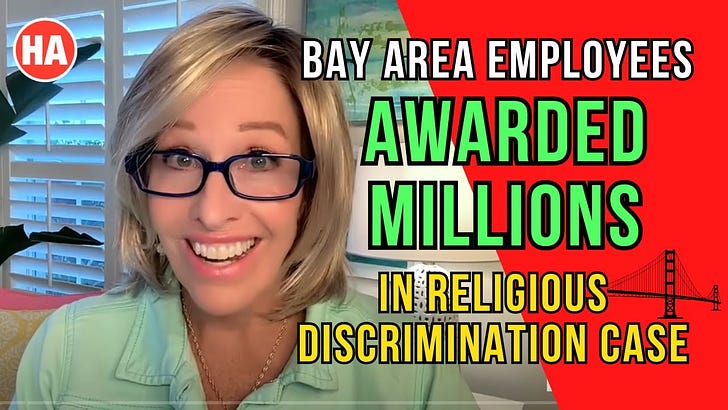JAW-DROPPING AWARD for RELIGIOUS FREEDOM💪
Federal Jury Awards $12 Million to Former Blue Cross Employee Fired Over Religious Objection to Vaccine 🎉
I told you this would happen! It was only a matter of time before lawsuits with million dollar verdicts hit those employers who discriminated against employees who didn’t want to become human pin-cushions.
Take this jaw-dropping case out of Michigan: a woman was awarded a staggering $12 million after being wrongfully terminated by none other than Blue Cross. That’s right, the same Blue Cross that’s made headlines before for its questionable practices.
Let’s not forget, Blue Cross has already felt the sting of losing before, shelling out around $700,000 to another employee they wrongfully terminated.
And if you think that’s the end, think again. The attorneys representing this woman have more than 200 additional cases just like hers pending.
Consider this a message to companies everywhere: play discriminatory games, win costly prizes. With more attorneys stepping up to the plate, I hope to see the era of unchecked religious discrimination coming to a very expensive end.
Before we go any further, take a look at these headlines, and see if you notice a rhetorical trend:
Again and again, these headlines harp on the word “refused,” painting her actions as though she crossed some forbidden line—as if following her God-given right to live by her faith was somehow a crime.
I know my fellow savvy, sharp, and sophisticated Healthy Americans understand that language matters. Here, this strategic wording of refused/refusal brainwashes people to believe that declining the shot was a rebellious act, as if she dared to defy what was “required” by standing firmly in her beliefs.
But here’s the truth: she didn’t just “refuse.”
She took a stand for her rights—specifically, her religious freedoms.
She asserted her right to object to a workplace policy that conflicted with her sincerely held beliefs. That’s a world apart from a mere “refusal,” and this difference is important to understand.
Friends, you are not required to do anything that conflicts with your own sincerely held religious, ethical or moral beliefs!
This distinction matters.
This is about more than just one case—it’s about protecting our freedom of religion. Whether you are a person of faith or not, we all benefit from a country where our freedoms—of conscience, of worship, and of belief—are safeguarded. When we lose that, we risk living in a state where loyalty is demanded not to God or personal convictions, but to the government itself.
Details of Latest Multi-Million Dollar Blue Cross Lawsuit
So, let’s get into why this particular victory is so important, what it signals for future cases, and how we got here with Blue Cross in the first place. This is just the beginning – and I am marching this all the way to Heaven and can’t wait to see justice served for so many others on the way.
Here’s the news in a nutshell:
Lisa Domski, an IT specialist at Blue Cross Blue Shield for 30 years, was awarded $10 million in punitive damages, $1.7 million in lost wages, and $1 million in noneconomic damages (emotional distress!) after being wrongfully terminated for her religious beliefs.
Blue Cross claimed Domski’s religious beliefs weren't sincere as grounds for denying her exemption and accommodation request, even though she worked from home.
But get this: after THIRTY YEARS of loyal service, working diligently as a dedicated employee, Clue Cross suddenly turn on Domski, calling her a liar, questioning her sincerity, and pushing her out the door. Friends, the mere fact that Domski risked her job and a 30-year career to stand by her beliefs shows just how sincere she truly is. The punitive damages in this case are crucial—they hopefully will serve as a deterrent to prevent such egregious misconduct from happening again in the future.
Domski’s case revolves around a request for a religious exemption and accommodation to Blue Cross Blue Shield’s covid vax policy because it conflicted with her beliefs. As a Catholic, she objected to vaccines developed using fetal cell lines.
Side Note: I don’t recommend using the fetal cell line argument as your only objection. What happens when a company introduces a pill, patch, spray, or a different form of injection that doesn’t use that specific line of development? This is why it's important to express your beliefs broadly, not just based on one specific objection.
Three Ways Employers Can Lawfully Deny a Religious Accommodation
The law provides three limited defenses for an employer to lawfully deny a religious accommodation request. Companies can use the following defenses:
Lack of sincerity – This means the employer claims the employee is lying about their religious beliefs. Gee whilikers! You’re telling me that a committee (or HR staffer) can judge the state of your soul? Now that’s elevating man above God. What’s next? Homosexuals have to prove their sexual orientation? How exactly do you prove a belief?!
Undue hardship – This must be proven with evidence. The burden of proof is on the EMPLOYER to DEMONSTRATE exactly why it cannot accommodate the employee due to hardship. And this hardship cannot be minimal; it must be a substantial burden. Blue Cross knew they couldn’t logically argue a hardship because the real hardship for the company would not be the employee working from home, oh no no no… the real hardship would be the cost of terminating an employee who has held the position for 30 years! The company would have to advertise for the job, spend time recruiting, interviewing, making job offers, hiring, and onboarding a new employee. Keeping an employee in their job, especially when they are working from home, is not a hardship.
Direct threat to others – This defense argues that the employee poses a danger to coworkers. However, in this case, the employee is working from home, so she is not a direct threat to anyone. (And even employees who are at the wokeplace cannot be considered to be a “direct threat” since there is no way to prove that one person “makes” another person sick! In that case, I would request from the employer a list of all the people I had infected previously, with proof that it was I, indeed, who infected them, and how that conclusion was arrived at. Even a third-grader can see how ludicrous this proposition of being a “direct threat” is. In fact, no one is a direct threat to others because there is no compelling evidence that any individual could be a threat spreading cooties to others! In California, for someone to be found liable for harming another or causing them to contract a contagious disease, three criteria must be met:
The person must have the disease and know they have it.
They must willfully seek to infect someone.
It must be proven that they actually infected that person.
Given these criteria, it is nearly impossible to prove that anyone knowingly infected another person, and certainly not even applicable to someone working from home.
Slimy Tactics to Smear Believers
Blue Cross knew it could not deny Domski’s request on the basis of hardship, and it could not deny her based on the claim that she was a direct threat. So, the only remaining defense they had was to argue that Domski was not sincere in her religious beliefs…
…but none of their defenses held water.
I find it truly despicable that employers like Blue Cross would stoop so low as to question the truthfulness of a trusted employee. Seriously? They trusted Domski for 30 years in a position of responsibility — yet when it came to expressing her sincerely-held beliefs, she suddenly was a liar?
This is why I call these slimy tactic. There was no other logical reason to deny Domski’s claim, so Blue Cross turned to a smear campaign to harm a Catholic.
There was no economic hardship in letting Domski continue her remote work. She wasn’t a direct threat, considering she was working from home. And her history with the company was exemplary — no disciplinary actions or issues to question. So, what was left? The company simply didn’t believe her religious convictions were legitimate.
What I would say to the Jury
If I were the attorney arguing this case, I’d say to the jury: "Members of the jury, this woman has worked for Blue Cross for 30 years in a position of responsibility. There is no indication that Blue Cross doesn’t trust her. She has had no disciplinary action, and she has been an exemplary employee. How is it possible that Blue Cross could suddenly say they don’t believe her? They don’t trust her? That they think she’s lying? Even though she has a 30-year track record of being a trustworthy employee?"
Employers love to deny accommodations, labeling employees as insincere. Yet, an entire jury found Lisa to be sincere. No religious leader needed to vouch for her faith, because under the law, your beliefs are your own—independent of any church, leader, or doctrine.
Key Facts about your Religious, Ethical or Moral Beliefs Protected by Law
Your beliefs are YOUR beliefs, not those of your church, spiritual leader, church doctrine, or religious scholars.
Your beliefs do not need to be “logical, consistent, agreeable, or comprehensible.”
You do not need to “defend your faith” or make someone understand it—you only need to express it.
Your beliefs are what you think or know to be true; they do not have to be established as facts. A fact is not the same as a belief. Your beliefs are protected by law, even if they are not supported by facts.
According to the EEOC, “your beliefs are easily established” and “generally not in dispute.” Your employer should generally accept that your religious beliefs are sincere.
Once you notify your employer of your religious exemption, your employer is required (duty-bound by law!) to provide a reasonable accommodation so you do not have to choose between your religion or your job.
And guess what? The jury knew it, too.
I understand that speaking openly about your faith can be challenging, but if you need personal support, that's exactly what we specialize in. My team is deeply committed to religious liberty and empowering others through education. We’ll guide you step-by-step, helping you understand your rights, avoid common pitfalls, and support you throughout the entire process. We've been successfully doing this for years, and we're here for you!
The information is available for free on my Youtube channel, but if you'd like personalized coaching you can visit TheHealthyAmerican.org to learn more → Religious Exemption Help
Blue Cross Needs to Be Held Accountable for more than just Monetary Damages
If I were the attorney on this case, I would put in a claim for the following (in addition to the monetary damages):
A public apology from Blue Cross to Lisa Domski, acknowledging the wrongdoing and promising to no longer engage in religious discrimination. Ideally, this would be in the form of a video from top Blue Cross Administrators, prominently posted on the website, along with a genuinely contrite statement vowing to never violate the civil rights of any employee in the future.
A private apology from every individual involved in discriminating against Domski. This should be in the form of a written letter and I would also like to see an in-person apology, or at the least, a phone call from each person who was involved in discriminating against her.
Religious non-discrimination training for Blue Cross, specifically under Title VII of the U.S. Civil Rights Act, which prohibits discrimination based on religion. Ideally, yours truly from The Healthy American would conduct the comprehensive training!
How to Hold These “Exemption Committees” Responsible
If you are getting the run-around from your employer trying to deny your religious accommodation (or if you are in the midst of an appeal or complaint), I strongly recommend that you ask your employer who is on the committee that’s discriminating against you? Demand this in writing. Find out who selected them, their job titles, and, most importantly, what training they’ve had under Title VII. And you also want to know each committee member’s statement of faith! This is crucial to ensure that you're not facing discrimination based on your religion—whether you're Christian, Muslim, Catholic, Mormon, Buddhist, or any other faith. How do you know the panel isn’t full of folks who don’t exactly have a soft spot for religious freedoms? That’s why you need assurance they have proper training to keep their biases in check.
Blue Cross issues a Strange, Bizarre Response to the Jury Verdict
Don’t you think Blue Cross should have acknowledged their wrong-doing and issued a simple statement such as, “We are sorry for violating the religious rights of this trusted employee and we plan to do better in the future.” Instead — like many crooks, cronies, frauds and phonies do — Blue Cross doubled-down and actually issued this statement: "We are very disappointed in the verdict the jury returned, and we plan on considering an appeal." Talk about arrogance, conceit, and condescension!
Do you have your insurance through Blue Cross Blue Shield? Let me know in a comment.
I belong to a private Christian Health Share, Samaritan Ministries, where we share each other's medical expenses.
Consider a Christian Healthsharing Network instead of Typical Medical Insurance
I don’t participate in the insurance racket—I'm happily uninsured. Here’s how it works in a nutshell:
Medical Need Arises – No network restrictions. You choose the healthcare provider that works for you.
Bills Submitted – Medical bills are sent to Samaritan Ministries.
Bills Get Paid – Members are notified and send you money to cover your medical expenses, along with prayers of encouragement.
It’s an affordable, beautiful alternative to traditional health insurance, and I’d love to see more people leave these corrupt insurance companies and join health share groups like Samaritan.
Back in the day, people didn’t rely on health insurance. You simply went to the doctor and paid for the service, just like you’d pay a mechanic for fixing your car—whether it’s getting new tires, changing your oil, or fixing the brakes. Health insurance wasn’t always the norm. It was originally only for hospitalization, and it started with Blue Cross!
History of Blue Cross and Blue Shield
Blue Cross began when Baylor University Hospital in Texas sought a way to make healthcare more affordable for patients. They introduced a plan where patients could prepay 50 cents a month for up to 21 days of hospitalization coverage. Soon, it expanded across the city, then the country. Blue Cross was created by Justin Ford Kimbell in 1929 while he was vice president at Baylor University’s healthcare facilities. His first plan offered teachers 21 days of hospital care for $6 a year. By the late 1930s, Blue Cross became a nationwide program.
So Blue Cross was for hospital care and Blue Shield was for medical care (going to the doctors). Fast forward to 1960, the U.S. government partnered with Blue Cross and Blue Shield to administer Medicare, making these companies deeply embedded in our healthcare system. But as we all know, over time, health insurance has only gotten more expensive, and healthcare costs have soared.
It’s clear that companies like Blue Cross Blue Shield were playing hardball—they were doing the government’s bidding and receiving incentives to make sure employees complied with these pin cushion policies. But here’s the good news: I’m celebrating this win, and there’s more to come. There are still 200 additional lawsuits in the works, and I’m hoping more attorneys will step up to the plate!
Read Next:



















Let's hope more of these cases proceed in the same way - and bankrupt some medical "insurance" companies.
I think it's wonderful that folks are winning these lawsuits.
But for every winner, there are tens of thousands of Joe / Mary Smiths who felt helpless when faced with that decision, then took the jab so they could keep their job...and keep putting food on the table. Many of them are now permanently disabled. Who speaks for them?